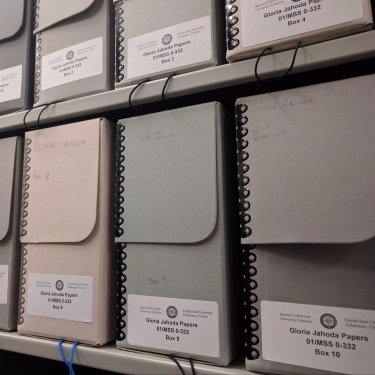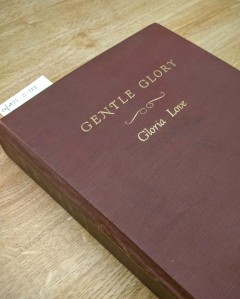Coming from a strictly public library background, at first the world of Special Collections felt just as foreign and mysterious to me as I’m sure it does to many people. Luckily, as a graduate assistant in Special Collections & Archives, I’m in exactly the right position to learn more about it every day. While it might seem obvious why some books are special — they’re often very old, or very scarce, or both — archives are a bit more elusive. As the Manuscript Archivist explained to me, archives provide contextual primary source documents to help researchers understand the environment surrounding a person or event.
 My first project as a graduate assistant involved the Gloria Jahoda Collection – or rather, collections. An author whose husband taught at Florida State University, Gloria Jahoda initially donated a portion of her personal notes and manuscripts to FSU Libraries forty years ago. Some donors might offer more material to the archives after the first gift; this can happen quickly or many years later. These new items are assessed to see if they fit within the scope of the initial donation and, in many cases, added to the same collection. Sometimes, though, this doesn’t happen. When I started working with her manuscripts, Jahoda’s work was spread across seven collections, all donated at different times. I was first tasked with looking over the materials to find a major theme that might unite them into a single collection. I divided the work into new series – like smaller chapters in a single book, series help organize a collection by grouping items together based on their original purpose. I then rearranged the materials, removed duplicate publications, relabeled folders, and copied unstable materials (like old newspaper articles) onto paper that wouldn’t discolor or deteriorate. As this was happening, I learned a lot about who Gloria Jahoda was.
My first project as a graduate assistant involved the Gloria Jahoda Collection – or rather, collections. An author whose husband taught at Florida State University, Gloria Jahoda initially donated a portion of her personal notes and manuscripts to FSU Libraries forty years ago. Some donors might offer more material to the archives after the first gift; this can happen quickly or many years later. These new items are assessed to see if they fit within the scope of the initial donation and, in many cases, added to the same collection. Sometimes, though, this doesn’t happen. When I started working with her manuscripts, Jahoda’s work was spread across seven collections, all donated at different times. I was first tasked with looking over the materials to find a major theme that might unite them into a single collection. I divided the work into new series – like smaller chapters in a single book, series help organize a collection by grouping items together based on their original purpose. I then rearranged the materials, removed duplicate publications, relabeled folders, and copied unstable materials (like old newspaper articles) onto paper that wouldn’t discolor or deteriorate. As this was happening, I learned a lot about who Gloria Jahoda was.
She was born in Chicago and was very proud of the fact that her first poem was published at the age of four. She liked to write on overlooked areas of Florida, including Tallahassee, which she described as being “200 miles from anywhere else.” She photographed her cats. She enjoyed classical music, especially by the English composer Frederick Delius. Her book The Road to Samarkand chronicled Delius’s life, including his time spent managing an orange plantation in Florida. She was an elected registrar of the Creek Nation. She spoke about ecology and conservation. Gloria Jahoda was bold, witty, and passionate.

What’s left behind after her death in 1980 are her books and, now, the Gloria Jahoda Papers. Visitors to Special Collections can track the development of Jahoda’s works, learn about her personal interests, and laugh at the jokes in her letters. Jahoda’s books document an interesting time in Florida’s development, and I’m proud to say I contributed to preserving her work for future research.
To learn more about the Gloria Jahoda Papers, the finding aid can be found here.